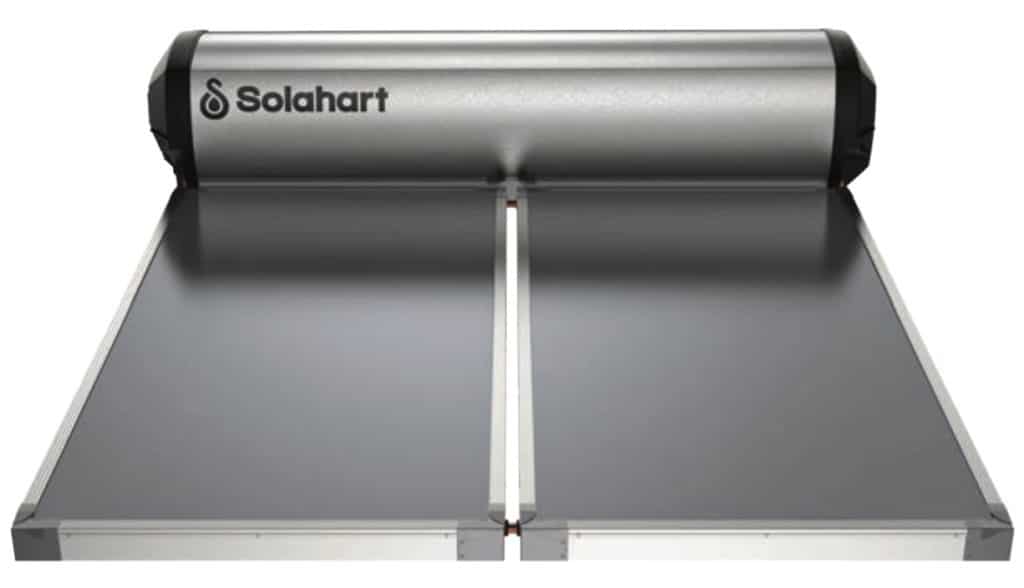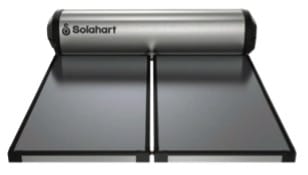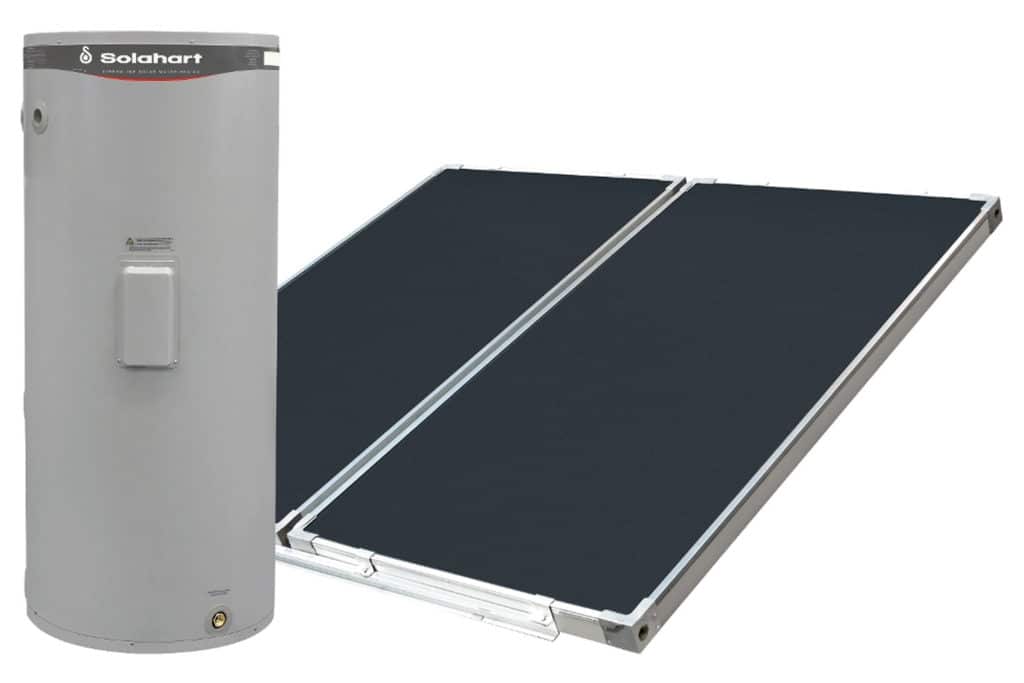Hot Water System
Install a solahart Solar Hot Water System
Making sure that you have a perfectly operational hot water system is one of the key concerns for any homeowner, and when there are so many different kinds of systems to choose from, it can sometimes be confusing to decide which one to opt for.
Most of the time, it usually comes down to the current circumstances of your existing home, but for many people, a solar hot water system is always an option that is high up on the list.
Here at David Lewis Plumbing we like to recommend solar hot water in Lismore whenever we can, and there are plenty of good reasons for this.
Installing a Solahart solar hot water system is made simple with the help of David Lewis Plumbing. We’re the leading Solahart distributors in the Lismore and the far north NSW region. Take advantage of the government subsidies that are currently on offer as an incentive for homeowners looking to make the switch to solar power.
Speak to us about arranging a consultation to provide a professional recommendation of the ideal hot water system to suit your home.
Make a positive impact on the environment today and speak to us about how we can install solar hot water heating at your home. Fill out an online enquiry form or feel free to give us a call today!
Our Recommended Solar Hot Water Systems:

Solahart L Series is a solar water heater specifically designed to provide economical service in medium to high solar gain areas. The black polyester powder coated aluminium absorber collects the sun’s heat and transfers it to the water in the copper risers. The increase in temperature causes it to rise and move into the storage tank where it displaces cooler water which then travels back into the solar collectors to be heated by the sun.
L systems can be installed with an optional Thermosiphon Restrictor Valve (TRV), an over-temperature protection system, to restrict over performance during periods of high solar radiation and lower hot water draw off.
Reduce Energy Use
Water heating energy use may be reduced by up to 65% and could save up to 1.7 to 2.6 tonnes of CO2 emissions per annum when replacing an electric water heater.

Solahart LCSD Series is a solar water heater designed to provide higher efficiency in low to medium solar gain areas. The LCS collector has an aluminium absorber plate with all copper header and risers. The absorber is coated with Mirotherm®, a sputtered selective surface widely used in Europe. The Mirotherm absorptive and anti-reflection layers provide high solar absorption, and an infrared reflection layer ensures low thermal emission, making the most of the available solar radiation.
LCSD systems are installed with a Thermosiphon Restrictor Valve (TRV), an over-temperature protection system, to assist in restricting over performance during periods of high solar radiation and low hot water draw off.
Reduce Energy Use
Water heating energy use may be reduced by up to 70% and could save up to 1.8 to 2.8 tonnes of CO2 emissions per annum, when replacing an electric water heater.

The Solahart MDV series is an open circuit split system solar water heater with roof mounted slimline collectors and a tank that can be installed discreetly on the ground.
Available in two types of solar collectors:
- L Collector
- CSA2007
While both systems guarantee to increase solar energy savings, the L collector is more suited to properties with a medium to high exposure to solar. The CSA2007 is a great choice for properties with a lower exposure to the sun due to it’s sputtered selective surface copper absorber plates.
Reduced energy use
Water heating energy use may be reduced by up to 65% to 75% and could save up to 1.7 to 2.9 tonnes of CO2 emissions per annum when replacing an electric water heater.
How Solar Hot Water Systems Work
In basic terms, solar water heating systems use solar panels called collectors that are fitted to your roof at the best angle for the sun.
- They then sit there and collect heat from the sun, using it to heat up water for your home in a stored cylinder.
- There are two main types of solar panels that people are currently using, the first are evacuated tubes which are a bank of glass tubes mounted on your roof tiles. The second option are flat plate collectors, which are either fixed on to your roof tiles or actually integrated into your roof for a more sleek and professional looking finish.
- You will need to make sure that you have at least five square meters of roof space that face east to west in order to get the most out of solar water heating.
- It is worth noting that large solar panels can also be placed on your roof to provide some contribution to the heating of your home as well.
We have a stellar reputation in the area and make sure that every single customer is catered for, no matter what their individual needs might be. We look forward to being able to help with the upgrade of your home’s hot water system!
Key Advantages of Solar Hot Water
Solar power has gotten increasingly popular in recent years due to the environmental benefits it can offer, and using it to heat the water in your home could be a great choice. About 20% of our domestic energy goes to the process of warming up the water, often at great expense.
Switching to solar can provide you with abundant and low-cost power, primarily saving you money through highly-efficient heat transfer. This can make it an excellent alternative to either gas or electric heating.
How Much Does It Cost On Average To Install A Hot Water System?
The cost to install a hot water system varies widely depending on the type of system you choose. Factors that affect the cost of installing your solar hot water system include the:
Size of the system: The size of the solar hot water system you choose impacts the final cost of installation. Larger systems generally cost more to install than smaller systems.
Type of solar panels: The type of solar panels used in the system can also impact the cost of installation. High-efficiency panels are generally more expensive than standard panels.
Location and orientation: If your roof is difficult to access or requires additional structural work to support the solar panels, this can add to the cost of installation.
Complexity of the installation: A more complicated installation may require additional labour and materials.
Incentives and rebates: Government incentives and rebates can help offset the cost of installation and may be available at the federal, state or local level.
Installer experience and reputation: More experienced installers may charge more for their services but also offer a higher level of expertise and quality of workmanship, providing peace of mind that the system is working as expected.
Solar hot water systems are usually priced higher than conventional gas or electric systems, but the long-term energy savings often makes up for the initial cost.
How To Prepare For Your Hot Water System Installation
If you’re interested in switching to a solar hot water system, the first step is to conduct thorough research into the kind of systems available in Australia. During your research, consider the different kinds of systems and try to form an understanding of several that might be suited to your needs.
Once you feel confident you understand solar hot water basics, research companies that specialise in installing solar hot water systems. Features to look out for include:
- The location of business
- Qualifications & insurance
- How many years they have been in business
- Reputation & reviews
- The brands they specialise in
- The quality of their service
Create a list of eligible installers and compare credentials before requesting quotes from them. Once you have your quotes, it should be easier to decide on the professionals best suited to ensure your solar hot water installation is completed correctly and efficiently.
Preparation For Getting A Solar Hot Water System
Check your roof: Make sure it is in good condition and can support the weight of the solar panels. Your roof must also be oriented and pitched correctly to maximise the efficiency of the panels.
Clear the area: Clear any obstacles or debris from the area of installation. This includes removing any furniture, plants or other objects that may be in the way.
Prune trees and foliage: If there are any branches or foliage that might shade your new solar panels, trim them back before the installation process begins.
Check your plumbing: Your plumbing should be in good condition and checked for leaks or other issues that could impact the installation process.
Notify your neighbours: If your solar hot water system installation might impact your neighbours, for example, if you need to block off a street or driveway, ensure you notify them in advance.
Why Choose Solar Over Gas?
Solar has Lower Carbon Emissions
Gas hot water systems release a lot of carbon dioxide into the atmosphere, which gets trapped in the ozone layer, gradually reducing our protection against the sun. Switching to solar drastically reduces your overall carbon footprint, helping you do your part to reduce the pressure upon the planet.
Solar hot water is Cheaper long-term
The installation of solar water heating can be somewhat expensive – this is balanced out over time by the money that you save due to increased efficiency. In contrast, the cheaper installation of gas heating comes with pesky lifetime costs that will add up to nullify any real benefit.
Solar hot water systems Takes up Less Space
Gas heating can take up a lot of indoor space compared to solar heating. A core aspect of this is the fact that the solar system is outside. You still need a high-capacity tank with solar that matches your water use, but it will still take up less space than a gas system.
Why Choose Solar Over Electric?
Electric Hot Water is Expensive
Choosing solar instead of electricity allows you to save even more, as electric heating is more expensive than gas heating. Every penny saved counts, and solar heating is a fine way to guarantee that the simple act of heating water does not burn a hole in your pocket.
Solar Hot Water Systems Require Less Maintenance
A solar water system requires far less maintenance than electrical water heating. The former will generally just need infrequent inspections, whereas the electrical equivalent needs more upkeep than this. This will only add to the cost of an electric system.
Solar Systems have a longer life span
Solar heating is estimated to last around 20-30 years without worry compared to electric heaters – these often stop working after just 15 years. Solar heaters and their associated collectors have the longevity you need for a high-quality solution.
Solar Heat Pumps
It doesn’t have to be a cloudless day for your hot water system to be functioning at its best. Solahart has designed a range of solar heat pumps that deliver concentrated levels of hot water for immediate use. A heat pump is also ideal for homes that have shaded, north-facing roofs.
Using state-of-the-art technology, our heat pumps use backup systems that ensure hot water is still available in freezing temperatures.
What is a Solar Heat Pump?
Solar heat pumps represent the integration of solar power and heat pumps – this is a reliable and efficient way of heating your home’s water. Solar has already proven its worth as a method of providing power to homes across and beyond Australia, making it a strong alternative for heating your water.
Solar thermal collectors are used to achieve this – these are similar to solar panels but specifically collect and use the heat rather than converting it to electricity. A solar heat pump transfers thermal energy so efficiently that the output of heat energy is often significantly higher than the input.
Solar Hot Water System FAQ's
How Much Do Solar Hot Water Heaters Cost to Run?
The cost to run a solar hot water heating device is roughly as much as your water costs. Some will cost a small amount to run the pump, but it is fraction of what you pay for a gas or electricity powered water heater. There may also be the need for servicing every few years, but the cost of servicing is coming down as solar water heaters are becoming more popular.
How Much Space Do They Take Up?
If you are looking for a typical solar panel that offers 200WP, then it will come to around 17 square feet. It seems like a lot, but even small houses have the roof capacity for solar water panels of this size.
Can I Use This System for My Pool?
If you are a pool owner, then a solar water heater can save you hundreds of dollars per year!
How Long Do Solar Hot Water Systems Last
Current estimates for modern devices stand at 23 years.

